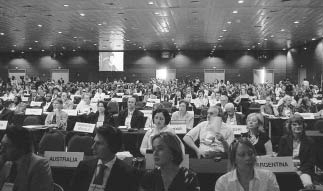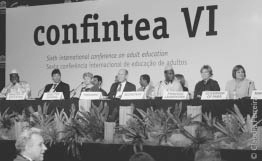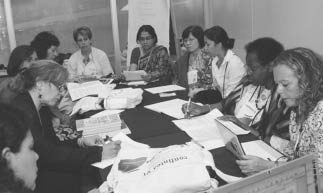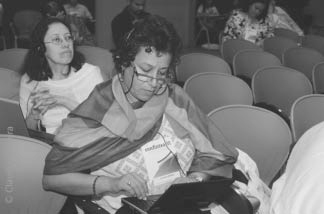Bettina Bochynek
The monitoring of compliance with the resolutions of CONFINTEA VI, globally and in individual countries, requires a strategy, a matrix, and the partners who are involved continuously in this task. This is not a selective and one-time evaluation, but a continuous, and as participatory as possible running process, which with its feedback provides support to the governments and other actors in Adult Education in developing their education sector.
Twenty Months Down the Road from CONFINTEA VI
Background and rationale for CONFINTEA VI
CONFINTEA VI was conceived as one element within a larger process. Previous cross-national gatherings, reflections, debates and policy dialogues – notably CONFINTEA V with its ensuing “Hamburg Declaration and Agenda for the Future”
– had made a case for adult learning and attested to the value of adult learning and education in equipping people to master and improve their lives. Thanks to these efforts and in view of a world immersed in an ever-accelerating pace of change and unresolved problems, it is gradually emerging as a general insight that the resources of today’s adult population cannot be left untapped.
At the policy-making level, there seems to be a growing understanding that the knowledge, skills and potential of adults need to be utilised and constantly expanded to confront the multiple challenges in our fast-changing and crisis-ridden world. The paradigm of Lifelong Learning, put forward by CONFINTEA V (1997) as the “key to the 21st century”, has been confirmed by CONFINTEA VI. Moreover, CONFINTEA VI underlined that adult learning and education at all levels and in all dimensions represent a significant component of Lifelong Learning, and that the human right to education includes the right to adult learning.
However, the worldwide reality is a different one. The first ever Global Report on Adult Learning and Education (GRALE 2009), prepared by the UNESCO Institute of Lifelong Learning (UIL) mainly on the basis of national reports from UNESCO Member States in the run-up to CONFINTEA VI, revealed the unsurprisingly so-bering picture. Despite some advances in the policies and conditions governing Adult Education and Lifelong Learning, notably in a few committed countries or sub-regions, most national education, cultural and social policies are not in fact prioritising adult learning and education as had been expected following CONFINTEA V. Insufficient funding, under-professionalisation of teaching staff and the entire sector, lack of coordination within ministries and lack of cooperation between stakeholders were but the main critical points. Added to this is the fact that adult learning – often confused with Lifelong Learning per se – has been reduced to an economistic understanding in one part of the world and confined to basic education or literacy in another. As is also commonly known, the concrete contribution of Adult Education to overall development remains unrecognised until this day.
Against this background, CONFINTEA VI set out to re-mobilise the international community and re-create the political momentum for adult learning and education. Concretely, the prime goal of CONFINTEA VI was to induce the global community to take some crucial steps forward, namely to move from rhetoric to action.
CONFINTEA V avoided thematic deliberations and attempted to focus on action-oriented concerns and implementation. The recommendations of the Belém Framework for Action adopted at CONFINTEA VI can be divided into three parts:
- The first part includes a series of recommendations and commitments made by countries to develop adult literacy and Adult Education in a Lifelong Learning perspective. These are structured according to key areas in adult learning and education, namely: policy development, governance patterns, financing modes, widening participation and ensuring equity, quality assurance and adult literacy.
- The second part contains specific recommendations and commitments of countries to establish national and regional monitoring and accountability measures. One of the central commitments is geared towards the muchawaited regular collection of data and analysis on participation of adults in learning activities, including progression, disaggregated by gender and other factors. With regard to the Belém Framework itself, countries made a commitment to establish regular monitoring mechanisms to assess the Framework’s implementation and to prepare national progress reports.
- Finally, the third part gives the mandate to UNESCO to support the follow-up and the monitoring of the Belém Framework on an international level. Concretely, it requests the UNESCO Institute for Lifelong Learning (UIL) in cooperation with the UNESCO Institute for Statistics (UIS) to coordinate the global monitoring process. In order to report on the progress in adult learning and education periodically, future versions of the Global Report on Adult Learning and Education (GRALE) are to be produced.

Plenary Session
Source: Björn Otte, UNESCO
First Steps to Coordinate the Monitoring Process
As an important mechanism to guide and support UNESCO in coordinating the monitoring process, a CONFINTEA Advisory Group was created in the beginning of 2010. For the time being, it includes representatives of governments which had shouldered a special responsibility in the CONFINTEA VI preparatory process or in its implementation (Brazil, Hungary, Kenya, Mexico, Morocco, South Korea, Tunisia and the United Kingdom), regional or international key stakeholder organisations (Association for the Development of Education in Africa/ADEA, Organization of Ibero-American States/OEI, International Council for Adult Education/ICAE, DVV International, and the Global Learners’ Network), and UNESCO offices (among them UIS). UN Agencies and multilateral organisations have been invited to become members of the group, and continue to be invited to the meetings. However, their responses have been rather restrained.
Involvement in the CONFINTEA Advisory Group is meant to be long-term, and both institutional as well as personal. The idea is for the Advisory Group to take stock of and give new impetus to the CONFINTEA VI follow-up process. Ideally, it would serve as a quasi-lobby group for adult learning and education, and members would be personally committed to act as advocates and multipliers of the Belém Framework within their own countries and regions.
Until today, the CONFINTEA Advisory Group has met twice, once in March 2010 at UIL and for the second time in May 2011 in Mexico City. During its first meeting, the Advisory Group strategised for the follow-up to CONFINTEA VI and agreed that increased communication and a systematic approach to monitoring the Belém Framework were needed. Mexico offered to host the first Regional CONFINTEA Follow-up Meeting (for Latin America and the Caribbean) as well as the second session of the Advisory Group. As a major outcome of that second session in Mexico, the Advisory Group provided advice on the draft questionnaire prepared by UIL for the first national post-CONFINTEA progress reporting. First elements for the regional follow-up process for the Arab States, Africa and the Asia/Pacific were discussed and planned. They are to be further elucidated and implemented in the latter part of 2011 and in 2012.
Preparing the Monitoring Tools
“What do we really want to know?” With this elementary question in mind, UIL and its sister institute UIS (the UNESCO Institute for Statistics, based in Montreal, Canada) embarked on designing a strategy and supportive instruments for the monitoring process.
Two documents resulted from that process: firstly, an Overall Monitoring Strategy, which outlines the elements and steps already undertaken or planned at different levels to follow up on the development of adult learning and education, within and beyond implementing the Belém Framework. The Strategy is meant to serve as a guiding tool for the overall monitoring process. Along with it, the second document drafted by UIL and UIS is the Global Monitoring Matrix, which is the technical tool to prioritise the recommendations and commitments of the Belém Framework and to help track them specifically.
Both documents were made available to governmental and non-governmental stakeholders for discussion and feedback. In October/November 2010, an International Online Consultation Forum was conducted by UIL, mobilising more than 300 participants from all over the world. The forum provided a collective space to share experiences, existing activities and problematic issues in monitoring nonformal adult learning and education, as well as specific CONFINTEA VI follow-up activities undertaken in countries or by networks. Among the many debates and useful proposals that emerged from the Online Forum, three main points can be singled out: the need to tap into a broader variety of sources besides national reports in the post-CONFINTEA VI process, in particular with a view to preparing the post-CONFINTEA Global Reports on Adult Learning and Education (GRALE); the necessity to conceive participation beyond enrolment rates and to document participation trends over time and finally the need to base all action and monitoring in literacy on the concept of “literacy as a continuum”.
In January 2011, UIL organised an International Expert Meeting at the Institute’s premises in Hamburg to continue the discussion and obtain more advice on the monitoring of the Belém Framework from representatives of governments. As a major outcome of the meeting, suggestions were made for the next issues of GRALE, which will be UNESCO’s main instrument in giving a global account of the CONFINTEA follow-up process. The specific proposal is to focus on one thematic aspect in each forthcoming GRALE, in addition to an overview on progress in all of the key areas of the Belém Framework. For the next GRALE, scheduled for publication in late 2012, the proposed focus is “adult literacy”. The meeting also suggested some particular areas where specific research would be needed to obtain the information which cannot be generated through national reports, namely conceptual definitions, financing mechanisms and the recognition, validation and accreditation of learning. Finally, the meeting produced concrete suggestions for the questionnaire for national progress reports.
Overall Monitoring Strategy
Being a guiding tool for the monitoring process, the Overall Monitoring Strategy is a theoretical model and constructs an ideal scenario. Taking this into account, the Monitoring Strategy adheres to several principles:
- Monitoring is not an end in itself; the monitoring process is meant to serve the development of the field of adult learning and education.
- National activities are at the core; countries do have the ownership of the implementation and monitoring process.
- All stakeholders need to be involved; the implementation and monitoring process needs to be based on partnerships within governments (intra-ministerial and inter-ministerial) and between governments and stakeholders from civil society from NGOs, the private sector, research institutions and networks and learners’ organisations.
- Monitoring needs to be integrated and simultaneous; the monitoring of the Belém Framework needs to be aligned with the monitoring undertaken as part of other agendas, both within countries as well as on an international level – in particular the Education for All (EFA) and Millennium Development Goal (MDG) agendas.

Panel
Source: Claudia Ferreira
The following elements, which are consecutive and parallel at the same time and also lead to each other in a cyclical process, are contained in the Overall Monitoring Strategy:
a) Setting up monitoring processes: e.g. national plans for adult learning and education with a built-in monitoring mechanism; national committees, bringing together all stakeholders from within and outside of government to coordinate the development of adult learning and education and its monitoring;
b) Developing indicators and targets which are contextualised within national priorities; harmonised with other regional and/or global agendas;
c) Collecting data and assessing progress through national and regional monitoring processes; the regular data collection of statistical offices and the UNESCO Institute for Statistics (UIS) as well as targeted research;
d) Reporting and disseminating results, including via national CONFINTEA progress reports; reports prepared for the monitoring of EFA (Global Monitoring Report) and the MDGs; and the forthcoming Global Reports on Adult Learning and Education (GRALE).
Global Monitoring Matrix
UIL’s and UIS’s basic idea behind the Global Monitoring Matrix was to create a tool for the operationalisation of the Belém Framework. The Matrix prioritises and breaks down the broad categories and comprehensive, sometimes overlapping, recommendations of the Belém Framework into more distinct items.
The Matrix focuses on the key areas and objectives of the Belém Framework (policy; governance; financing; participation and inclusion and quality). However, adult literacy, which is a separate area in the Belém Framework, has been integrated into the other sections in the Matrix, so that it can be taken into account and monitored transversally.
Subsequent to the identification of more concrete items, core questions to track the possible essential developments were conceived, followed by the formulation of indicative, i.e. potential answers to these questions. Finally, possible sources of information were identified.
It is important to keep in mind that both the Overall Monitoring Strategy as well as the Global Monitoring Matrix are work in progress. They will change with the monitoring process and be adapted with the evolving developments and requirements.
The Global Monitoring Matrix in particular is conceived as a template – the term “global” including the notion of a general and basic tool. It is meant to be utilised, adapted and contextualised by everyone interested in monitoring the Belém Framework and in need of a tool. The indicative answers included in the Matrix can be further developed into indicators and targets.

The First Regional CONFINTEA VI Follow-up Meeting
A first adaption of the Global Monitoring Matrix to a specific context was undertaken in the context of the first regional CONFINTEA VI follow-up meeting for the Latin America and Caribbean region. Mexico, a member of the CONFINTEA Advisory Group, hosted the meeting entitled “From Commitment to Action: Taking the CONFINTEA Agenda Forward” from 25 to 27 May 2011 in Mexico City. Around 250 participants from 48 countries, including four ministers, three vice-ministers, representatives from international and regional governmental and non-governmental organisations, attended the meeting.
Led by the UNESCO Regional Bureau of Education in Santiago de Chile (OREALC) in cooperation with UIL, the Global Matrix was enriched with three elements:
- priority needs for the region in any of the key areas of the Belém Framework,
- selected examples of national or regional progress made in those areas and 3) proposed national and regional “action points” for implementation.
During the three days of the Conference, participants from the region shared their experiences on progress and reported on the challenges and plans in their countries in relation to follow-up of the commitments made in the Belém Framework. However, given that the meeting took place only one and a half year after CONFINTEA VI, little progress could be reported. Despite the impact of the global financial crisis, it could at least be observed in a number of countries in the region that the right to free public education and even Lifelong Learning for all is increasingly recognised. Discussions during the meeting underlined that it is necessary to raise the profile of (youth and) adult learning and education within a sector-wide and cross-sectoral perspective by multiplying alliances with other sectors, partners and actors and by cultivating a culture of Lifelong Learning in the Latin American and Caribbean societies.
The added value of the meeting was the discussion of action points which will help take the CONFINTEA agenda forward in the region. At the end of the meeting, participants had discussed and suggested 55 concrete points for national (26) and regional (29) action. These action points were integrated into the “Regional Matrix for the Implementation and Monitoring of the Belém Framework for Action in Latin America and the Caribbean”, and mark the crucial outcome of this first regional monitoring meeting.
Questionnaire for National Progress Reports – towards GRALE 2012
The Global Monitoring Matrix has also been used by UIL and UIS to develop the questionnaire for post-CONFINTEA VI progress reports. While these national reports will not be the only source for the first post-CONFINTEA Global Report on Adult Learning and Education (GRALE), which is scheduled for publication in the latter part of 2012, they will constitute one major source of input.
As proposed by the International Expert Meeting on Monitoring the Belém Framework earlier this year, GRALE 2012 will focus on adult literacy. 2012 also marks the end of the United Nations Literacy Decade (UNLD). Hence, in cooperation with UNESCO Headquarters, a combined questionnaire was designed to monitor progress in adult learning and education and the implementation of the Belém Framework and to assess the results of UNLD. Thus insights and data from both agendas, which are closely related, will mutually enrich each other.

CONFINTEA VI, working group
Source: Claudia Ferreira
An Editorial Board has been set up, composed so far of representatives from China, Ecuador, South Africa, the United Kingdom, the United States of America as well as UIS and UIL. Convening in a first meeting in July 2011, they already discussed the overall outline for GRALE, as well as reflecting on the specific topics for background papers. This process is still ongoing. The important news is: pending final technical and formal approval, the questionnaire will be sent out to countries in October 2011. UIL will ensure that the questionnaire will also be available online, and that the actual dispatch will be accompanied by a public launch so that all stakeholders in the respective countries can take the initiative to approach their ministries for involvement in the national reporting process.
Persistent Challenges
Various conceptual understandings – or misunderstandings – continue to exist and impede a more rigorous and systematic development of the field. The conception of all education as being part of an overarching Lifelong Learning system, where all education and learning is linked and bridged and where Adult Education and learning have their due place, has still not permeated the thinking of policy-makers and educators. The field is complex and scattered: having to mend things and advocate on all fronts absorbs energy and weakens focus. Resources for education remain scarce, and competition instead of complementarity and integration rule the allocation of funds – and of attention.

CONFINTEA VI, workshop
Source: Claudia Ferreira
In order to make the most out of the process, some issues and critical questions with regard to monitoring the Belém Framework must still be addressed as we go along:
- Monitoring is not an end in itself. How do we collectively exploit every monitoring step and element and use them to provide a forward-looking strategic and pragmatic plan of action, rather than a retrospective narrative account?
- The core and ownership of all monitoring lies within the countries themselves. How can we ensure that national monitoring processes include all stakeholders – from government, civic society, research institutions and learners?
- There are huge technical problems in data collection and monitoring a complex and fragmented field. The questions here are: How can we design quantitative and qualitative indicators which cover a broader spectrum of Adult Education and Lifelong Learning, in particular taking into account quality and participation?
- And last but not least: Adult education has been recognised in the Belém Framework “as an essential element of the right to education”. The overwhelming question here is: How can we monitor that people are enabled to exercise their right to Adult Education?


